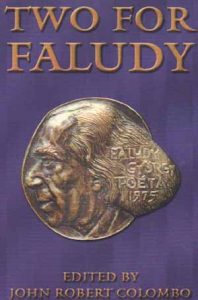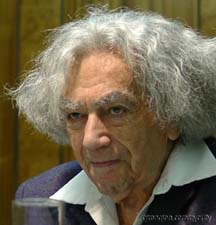 Two for Faludy reprints the texts of two collections of translations of poems of George Faludy, Hungary’s leading poet. The collections are East and West, which appeared in 1978, and Learn This Poem of Mine by Heart, which appeared in 1983.
Two for Faludy reprints the texts of two collections of translations of poems of George Faludy, Hungary’s leading poet. The collections are East and West, which appeared in 1978, and Learn This Poem of Mine by Heart, which appeared in 1983.
In all, there are 114 poems translated from the Hungarian into the English by 15 writers: John Robert Colombo, David Donnell, R.G. Everson, Andrew Faludy, Eric Johnson, George Jonas, Arthur Koestler, Dennis Lee, Gwendolyn MacEwen, Kathleen Szasz, Robin Skelton, Raymond Souster, Fraser Sutherland, Stephen Vizinczey, J. Michael Yates.
In addition there is a sketch of the poet by Don Evans (“Isaac Bickerstaff”) and a medallic image executed by Dora de Pédery-Hunt, as well as an appreciation of the poet and humanist by humorist George Mikes and columnist Barbara Amiel. The present volume adds the texts of a letter to the poet written by David Miller, Mayor of Toronto, and a tribute delivered in Budapest by Grace Westcott, co-chair of Toronto’s Legacy Project, which is dedicating a park to honour the poet.
Two for Faludy has been edited by John Robert Colombo who earlier compiled East and West and Learn This Poem of Mine by Heart.
Colombo & Company / Battered silicon Dispatch Box, ISBN 1-55246728-X, 240 pages, $28.00

Preamble to the Book
By John Robert Colombo
 “An Evening Honouring the Poetry of George Faludy” was held at the Toronto Reference Library the evening of September 21, 2005. This noteworthy event in the cultural life of the city was organized by Ibi Gábori and in attendance were a number of the city’s writers and artists and members of its Hungarian community.
“An Evening Honouring the Poetry of George Faludy” was held at the Toronto Reference Library the evening of September 21, 2005. This noteworthy event in the cultural life of the city was organized by Ibi Gábori and in attendance were a number of the city’s writers and artists and members of its Hungarian community.
The evening met many needs. It celebrated the ninety-fifth birthday of the distinguished Hungarian poet George Faludy who was born in Budapest on September 22, 1910. It launched the chapbook Faludy in English. It recalled Faludy’s residence in the city from 1966 to 1983. It announced the decision of the City of Toronto’s Legacy Project to dedicate a parkette in his honour and to call it George Faludy Place. The parkette corresponds to a greensward located immediately across the street from the apartment building at 25 St. Mary Street, where Faludy, as an émigré writer, resided. Indeed, he was living in this building in apartment 1608 when he acquired Canadian citizenship in1976. Earlier he was the guest of long-time friends Ibi and George Gábori in their apartment, Number 206, 2601 Bathurst Street. It was noted that the dedication ceremony would take place in Summer 2006 to coincide with the fiftieth anniversary of the Hungarian Uprising of 1956. This insurrection marked a phase in the Cold War, and to everyone’s surprise it leavened the cultural life of Toronto (and hence the Dominion of Canada). Following the Uprising, some 37,000 Hungarian refugees were admitted to the country, with 27,000 settling in Ontario, mainly in the Toronto area. Indeed, on an official visit to the city in the late 1990s, Árpád Göncz, Hungary’s President, declared, with authority and humour and with reference to Faludy’s residence, here, “Toronto is Hungary’s second city”. Central to all of these needs, the evening of celebration was a long-overdue appreciation of Faludy the man, the tribune, the poet.
Andrea Jarmai, the Toronto writer of Hungarian background, who, with her husband David Newel, publishers of the chapbook, requested that I contribute to the events of the evening, but as it happened, my wife Ruth and I had already booked flights to Europe; there was no turning back. So I asked Andrea for permission to make a virtual appearance through the contribution of a brief memoir that I would read that evening, along with a recital of “Poet’s Return”, my translation of one of Faludy’s poems that had met with his particular approval. (The text of the poem appears in East and West.) She agreed to this proposal and asked Daniel Kolos, another poet with a background in Pannonia, to read the memoir and the translation that evening. That is precisely what happened.
I will allow the brief memoir to do double duty as the Prefatory Note to the present work, which consists of the texts of the two collections of Faludy’s poems in English which I edited and largely translated. Their titles are East and West: Selected Poems by George Faludy (Toronto: Hounslow Press, 1978) and Learn This Poem of Mine by Heart: Sixty Poems and one Speech by George Faludy (Toronto, Hounslow Press, 1983). These two volumes were commercially published but have been out of print for decades. They appear here, complete and unabridged, with some corrections.
Friends of Faludy and fans of his prose and poetry will be pleased to note that there are other Canadian publications of interest. Here are the main ones:
- A book of meditations, Notes from the Rainforest (Toronto: Hounslow Press, 1988)
- A collection, George Faludy: Selected Poems: 1933-1980 (Toronto: McClelland & Stewart, 1983) edited by Robert Skelton
- Three pamphlets of poems in versions by Robert Skelton: Twelve Sonnets (1983), Ballad for Isabelle (1984), Corpses, Brats and Cricket Music (1987);
- The chapbook Faludy in English: Translations from the Poems of George Faludy (Toronto: Fooliar Press, 2005), edited by Andrea Jarmai and David Newel.
 Elsewhere in these pages will be found the names of the translators of the poems and of the men and women who made other notable contributions. Right here, I am pleased to acknowledge the friendship and assistance of the late George Gábori and his wonderful wife Ibi; poet and columnist George Jonas; artist and designer Susanna Wald; medalist Dora de Pédery-Hunt; long-time friend Ildiko Hencz; publisher Anthony M. Hawke; friends Laszlo and Susan Jarmai; poet and publisher Andrea Jarmai and David Newel; poet and Egyptologist Daniel Kolos; broadcaster Magda Zalán and singer János Tessányi; patron Hanna Reichel; Grace Westcott, co-chair, Toronto Legacy Project, city of Toronto; and George A. Vandenburgh, publisher of the present work.
Elsewhere in these pages will be found the names of the translators of the poems and of the men and women who made other notable contributions. Right here, I am pleased to acknowledge the friendship and assistance of the late George Gábori and his wonderful wife Ibi; poet and columnist George Jonas; artist and designer Susanna Wald; medalist Dora de Pédery-Hunt; long-time friend Ildiko Hencz; publisher Anthony M. Hawke; friends Laszlo and Susan Jarmai; poet and publisher Andrea Jarmai and David Newel; poet and Egyptologist Daniel Kolos; broadcaster Magda Zalán and singer János Tessányi; patron Hanna Reichel; Grace Westcott, co-chair, Toronto Legacy Project, city of Toronto; and George A. Vandenburgh, publisher of the present work.
Master Faludy put an indelible mark on Canadian literature and culture. Arriving at a time of nascent cultural nationalism, he gave it both a boost and an international depth and spin. His name is spoken in the same breath as the names of Jacques Maritain, Etienne Gilson, Andre Breton, John Grierson, Tyrone Guthrie, Clement Greenberg, all of whom contributed creatively to this country. With them belong Jane Jacobs, Judith Merril, and Joseph Skvorecky, and with Faludy too.
With the collapse of communism, Faludy returned to his native land, where new books were published, old books were reprinted, and he was acclaimed as a national hero. Almost as an aside: In 2002, in his early nineties, he took the hand in marriage of Fanny Kovács, a stunning blonde model and writer in her mid-twenties. The unexpected alliance caught the attention of the Budapest public, especially when eye-popping colour photographs of the loving couple graced the premiere issue of the Budapest edition of Penthouse. Even in his ninth decade, George remains a man of surprising accomplishments.
In passing it is interesting to note (though so far it has gone unnoticed!) that the poet’s surname disguises the word ludic, Latin for “play”.
From his roomy flat in Pest, with its view of the Margaret Bridge that crosses the Danube from Pest to Buda, Faludy expressed gratitude to Canada and Canadians. Faudy was interviewed by Ronald de Souza for a profile that appeared in The Globe and Mail, June 23, 1990. The poet compared the lifestyles of Canadians and Hungarians. Here is what he told the interviewer:
“Canada is a peaceful country. Here, in Hungary, every day there is excitement. In each country, one longs a little for the other.”

Prefatory Note
By John Robert Colombo
I am grateful to Ibi Gábori and Andrea Jarmai and David Newel for organizing this tribute and publishing the chapbook Faludy in English, and I am deeply sorry that my wife Ruth and I are unable to attend in person.
In person we are in Paris, but in spirit we are among you at the Toronto Reference Library, one of my favourite “haunts”.
I am also in the debt of Daniel Kolos for agreeing to read “The Poet’s Return”, my favourite of the one hundred or so poems composed by George Faludy that I translated with his blessing and, of equal importance, in his company.
We would meet weekly and work side-by-side on these translations – at first during the winter at our house on Dell Park Avenue in North York, and then years later during the summer at his apartment on St. Mary Street in downtown Toronto. Perhaps both sites should be plaqued!
From his massive volumes of Collected Poems, George would recite a text in Hungarian and then translate it line by line into English. I would catch the words in the typewriter-those were the days of typing, not yet of keyboarding-and then we would discuss them to determine where the language ended and the poem began. I would rewrite the drafts and then submit them to his critical eye and ear the following week. We did this week after week until we were satisfied (more or less) with the finished works.
On one occasion I observed that George was not reading one of the poems from his collection but reciting its lines from memory. When he finished, I asked him about this feat of memory. He explained, “I just remembered it. I wrote it in the camp. I memorized it. I forgot to write it down.”
I wish I could say that the text in question is my favourite poem, “The Poet’s Return”, but I am not now certain that it was. However, one of the reasons why his poem is my favourite is the fact that it contains two most remarkable words.
Those words are “St. Socrates.”
Think about their meaning.
After Daniel had read that poem, you will know why they are remarkable and why the man who wrote them, George Faludy, is such a remarkable man.
Servus.
